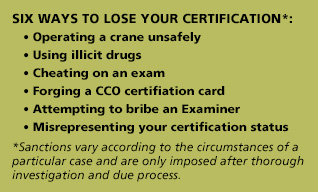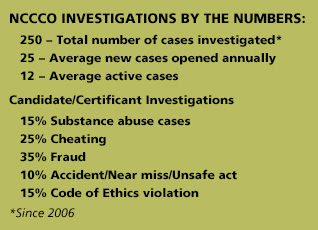NCCCO provides employers with key tools to preserve the integrity of the CCO certification process.
February 2018—While the vast majority of participants have nothing to fear from the procedures that NCCCO has put in place to ensure that those who hold a CCO certification card abide by the rules, for those who don’t, the consequences can be severe. And, with CCO certification mandated in many parts of the country, and the federal OSHA requirement looming, that could mean being deprived of your livelihood.
When NCCCO introduced  its beefed-up ethics and discipline program several years ago, the sharp and direct tone was intentional: Break the rules and risk losing your certification.
its beefed-up ethics and discipline program several years ago, the sharp and direct tone was intentional: Break the rules and risk losing your certification.
“We needed to send a message to the (admittedly, very small) minority that NCCCO will not tolerate any attempts at subversion of its certification process and that any challenges to the integrity of the program will be dealt with to the fullest extent of our authority,” said NCCCO’s Ethics and Discipline Committee Chair, Ron Kohner.
Even so, some employers are not fully aware that investigating complaints is a central and active component of NCCCO’s support of its certification system. “We take reports of inappropriate behavior very seriously and are prepared to impose sanctions up to and including permanent revocation of certification,” said Kohner.
Kohner said that NCCCO provides two key integrity tools to employers. Tool #1 is the NCCCO investigative process. Tool #2 is the certification verification system.
Tool #1: Report Unethical Behavior
 NCCCO may become aware of an incident requiring investigation as a result of information received from any one of a number of sources: employers, examiners, state agencies, co-workers, even the certificant himself. In any given year, NCCCO might have a dozen or more investigations underway into allegations of misconduct by certificants, and NCCCO treats each complaint seriously, recognizing that any one infraction could lead to tragic consequences.
NCCCO may become aware of an incident requiring investigation as a result of information received from any one of a number of sources: employers, examiners, state agencies, co-workers, even the certificant himself. In any given year, NCCCO might have a dozen or more investigations underway into allegations of misconduct by certificants, and NCCCO treats each complaint seriously, recognizing that any one infraction could lead to tragic consequences.
NCCCO uses a three-step, fully transparent process to ensure that allegations of misconduct are fairly and reasonably investigated, and to protect the public against unprofessional and unethical conduct:
1. Review of Complaints. Complaints are received and reviewed by the Program Integrity Team, an internal body composed of staff members with years of experience in program integrity matters.
2. Full and Fair Investigation. All actionable matters are fairly investigated and adjudicated by NCCCO’s Ethics & Discipline Committee, with notice given to the affected party. Sanctions may range from a warning up to revocation of certification.
3. Appeal Stage. An opportunity is provided for appeal to a separate appeals body of any sanction imposed to ensure fairness and due process.
“NCCCO goes to great lengths to protect the integrity of its programs by proactively seeking to ensure compliance with its policies and thoroughly investigating any allegations of misconduct,” said NCCCO Director of Administration and General Counsel John Zarian. “For example, every candidate signs an agreement promising to comply with, among other things, NCCCO’s Code of Ethics and the Substance Abuse Policy, and it seems only fair and reasonable that failure to do that will result in sanctions.”
Tool #2: Verify Certification
So what happens when a certified crane operator has his or her certification revoked? Clearly, ready access to information is important for employers who are hiring crane operators, and that becomes particularly important if the sanctioned operator fails to return his (now invalid) certification card.
 That’s where NCCCO’s Verify CCO Online (VCO) system plays such a vital role. VCO provides instant checking of CCO certification at no cost via a link on the NCCCO home page (pictured) or directly online at www.verifycco.org, and it has proven to be a highly accurate and reliable means of verifying credentials.
That’s where NCCCO’s Verify CCO Online (VCO) system plays such a vital role. VCO provides instant checking of CCO certification at no cost via a link on the NCCCO home page (pictured) or directly online at www.verifycco.org, and it has proven to be a highly accurate and reliable means of verifying credentials.
Users can obtain information from VCO at any time, 24/7, and from most devices with an Internet connection, including computers, smartphones, and tablets. Even though different certifications may have different expiration dates, entering a valid certification number provides a listing of all of a person’s CCO certifications and their expiration dates.
“The VCO certification verification system is an employer’s first line of defense against certificant fraud,” says Peter Juhren, VP Operations, Morrow Equipment Co. “Verifying operators’ certification through the online system should be standard practice for all employers, both at the point of hire and periodically during employment. It’s quick, it’s easy, it’s free, and it’s available 24/7.”
In addition to major industrial and construction crane users, the system is now in widespread use by federal, state, and local government agencies, including OSHA and the U.S. Army Corps of Engineers. Thousands of users from all 50 states and the District of Columbia, as well as Canada and Australia, have registered to use VCO, which has also played a major role in reducing the incidence of misrepresentation of credentials by certificants and even the rare cases of fraud.
“No forgery, however good, can survive the scrutiny provided by the VCO system,” said Zarian. “If a certification doesn’t show up when a search is conducted via VCO, it either is not in good standing or simply doesn’t exist.”
Indeed, the development of the VCO system has dramatically reduced the number of incidents involving doctored certification cards or misrepresentations of certification status.
“It’s all part of our commitment not just to our candidates, who have a reasonable expectation that all those certified by NCCCO will abide by the rules, but also to the employers who need to have faith in a system that will hold all certificants to account,” said NCCCO CEO Graham Brent.